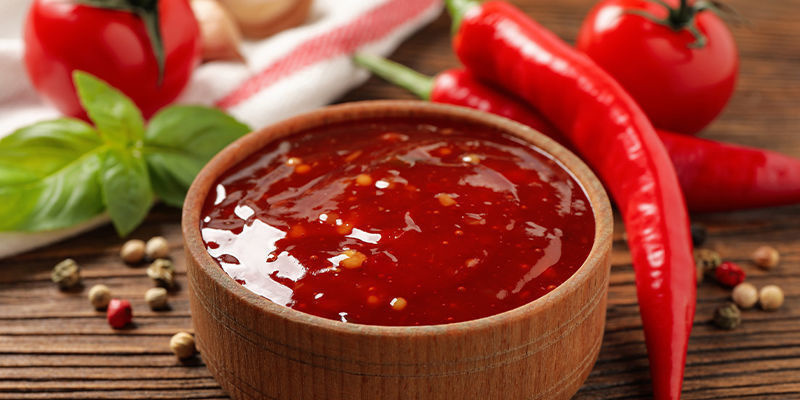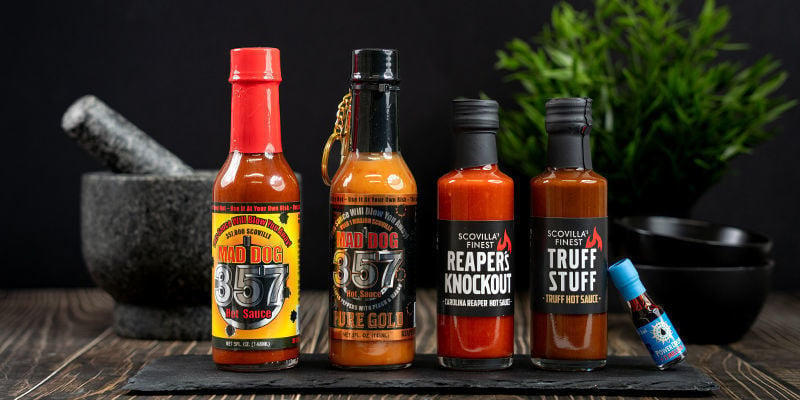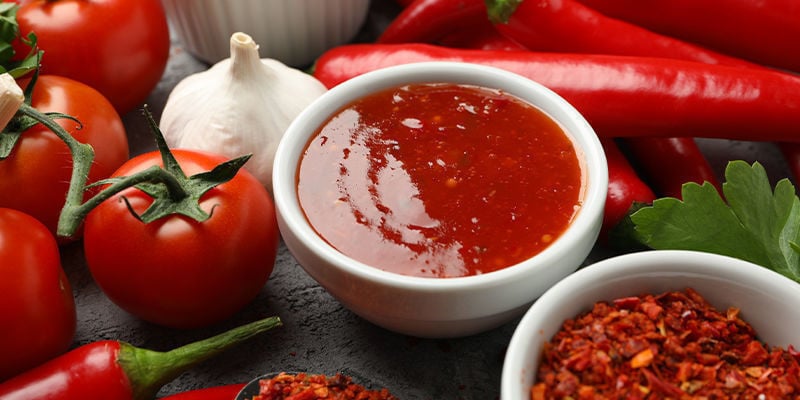
Is Hot Sauce A Secret Superfood?
Some people revel in the rich flavour and intense burning sensation of hot sauce, whereas others can barely handle a drop of ketchup without reaching for a glass of water. Whatever you think about hot sauce, you should at least know about its impressive health benefits! Find out what recent research says about this fiery condiment.
Hot sauce: you either love it or physically cannot tolerate it. Many among us not only love the taste of the stuff but genuinely enjoy the fiery sensations that so many others cannot bear. Regardless of how you feel about hot sauce, it possesses potential health benefits that you should definitely know about!
What is hot sauce?

By definition, hot sauce is a condiment that generates an intense feeling of heat in the mouth—and elsewhere! However, there are a variety of spices that light up the central nervous system in a way that makes people describe them as “hot”. Unlike other pungent, spice-based sauces that contain the likes of horseradish or wasabi, hot sauces generate their signature kick thanks to their principal ingredient: chilli peppers.
More specifically, the active component capsaicin underscores the hot sensation of consuming a mouthful of food infused with hot sauce. This molecule targets a receptor called TRPV1—a site involved in pain detection and sensory transmission.
Hot sauces are categorised based on their capsaicin content, and therefore spiciness, using a tool called the Scoville scale. This system uses a metric called Scoville heat units (SHU), which indicates how many times the number of capsaicin compounds in a particular chilli can be diluted before they become undetectable. For example, jalapeño peppers typically clock in at a SHU of 2,000–8,000, meaning it takes the same amount of dilutions for their capsaicin content to become undetectable when measured.
The SHU rating varies dramatically among chilli varieties. Less spicy chillies such as poblanos rank at a measly 1,000–1,500 SHU, whereas titans such as the Carolina Reaper can measure as high as 2,300,000 SHU.
How to use hot sauce
As a popular condiment, there are a host of ways to put hot sauce to use in the kitchen. These include:
- Add to a stir fry: Hot sauce and stir fry go hand in hand. Few dishes benefit from a capsaicin kick as much as a nourishing and delicious stir fry. The possibilities are endless; keep it vegan, or incorporate pretty much any meat of your choosing.
- With wings: Well, there’s one dish that might actually benefit from spicy heat even more than a stir fry—the humble wing. Something about the fatty skin, the satiating meat, and the kick of hot sauce form a culinary trio unlike any other.
- Spice up a salad: A bowl of vegetables, huh? Doesn’t sound like the most exciting of meals. Whether you have herbivorous tendencies or are simply trying to add more phytonutrients to your diet, adding a drizzle of hot sauce can spice up the experience of lettuce munching.
- Warm your soul with soup: Got a sniffle? Feeling that winter bite? Fire up the stove and get some soup simmering. The only thing missing? A big fiery dollop of hot sauce; warm yourself up from the inside out!
What are some potential benefits of hot sauce?

Adding hot sauce to almost any savoury dish can greatly enhance the culinary experience in various ways, from improved flavour to a drug-like masochistic kick, without drastically increasing the calories in question. But the many unique fiery formulas available offer more than a novel sensory experience. Emerging research shows that hot sauce offers several health benefits, potentially placing the condiment within the league of a superfood.
Hot sauce and weight management
Capsaicin possesses what researchers call “anti-obesity potency” (Zheng et al., 2017). What does this mean? Well, it turns out that the active component of chilli peppers shows potential for improving metabolic health and weight loss. The chemical may help to reduce appetite and, therefore, caloric intake. On top of this, capsaicin activates brown fat—a type of fat that has thermogenic capabilities and can help the body burn calories by regulating body temperature.
Hot sauce and the immune system
You owe your immune system a lot; you wouldn’t be sitting there reading these very words without it. Right now, its many members are patrolling your body and kicking the daylights out of uninvited pathogenic deviants. To return the favour, you might want to treat it to some hot sauce. Chilli peppers are packed with vitamin C, which plays a key role in immune function. As a concentrated form of chillies, hot sauce contains plenty of this antioxidant. However, make sure to procure a hot sauce made from processed chillis for maximum vitamin C content. Some products contain plenty of capsaicin extract, but very little chilli peppers.
Hot sauce and inflammation

While previously deadly communicable diseases are now far less of a threat to civilisation thanks to modern medicine, we’re instead plagued by chronic inflammatory diseases that stem from the features of modernity—including sedentary lifestyles and poor diets. Early animal studies show that capsaicin can produce an anti-inflammatory effect comparable to diclofenac—a drug used to reduce inflammation in cases of arthritis and acute muscle and ligament injuries (Jolayemi & Ojewole, 2013).
Hot sauce and mood
People who find great pleasure in ingesting the hottest chillies are often perceived as strange. But is there a method to their madness? It turns out that those who love the infernal sensations of a potent hot sauce are actually capitalising off of a complex neurochemical cascade. You see, in response to the pain generated from consuming hot sauce, the body releases a flood of endorphins—feel-good chemicals tied to elevated mood (Choy, El Fassi, & Treur, 2021). Animal studies show that capsaicin also initiates anti-depressive effects by acting on the TRPV1 receptor (Pasierski & Szulczyk, 2022).
Hot sauce and the heart
Research shows that capsaicin could help to decrease the risk of coronary heart disease—the biggest killer of the modern era. A randomised, double-blind, placebo-controlled study shows capsaicin supplementation to boost fasting HDL cholesterol while decreasing triglycerides (Qin et al., 2017). Put simply, the spicy compound helped to improve risk factors of the disease.
Are there any side effects to using hot sauce?

Early research suggests that hot sauce offers some impressive health benefits. But are there any downsides to wolfing down liquid fire? As you can imagine, hot sauce doesn’t agree with everyone. Check out some of the chief concerns below.
Potentially high sodium levels
Some hot sauces are considerably high in salt. If you’re somewhat of a fiend for the stuff, you could end up pushing your daily salt intake over the World Health Organization’s recommended limit of less than 2,000mg. Excess dietary salt can lead to manifold health issues, including high blood pressure and heart disease.
May not be suitable for sensitive stomachs
Capsaicin can catalyse nothing short of gastrointestinal misery in those sensitive to the pungent molecule. By irritating the digestive system, the compound can trigger stomach pain and diarrhoea. Those with stomach ulcers and similar conditions are advised to skip the hot sauce when dinner time swings around.
Potential for severe pain
Some people are much more sensitive to capsaicin than others. Genetic differences among individuals mean that some people possess far higher quantities of TRPV1 receptors. Because these sites are tied to pain transmission, even mild chillies can hit such individuals hard. Throw an exceptionally hot chilli into the mix, and you have a recipe for pain that’s severe enough to land an unfortunate few in the hospital.
5 hot sauces to discover

Whether you’re a hot sauce connoisseur or just starting to dip your toes into the pond of fire, we’ve got some elite-level preparations for your taste buds. These carefully crafted concoctions will infuse your meals with tantalising tastes and bursts of heat. Check out five stellar hot sauces below, and find out why they deserve a place in your kitchen cabinet.
Hot Sauce (Mad Dog 357)
Hot sauce by Mad Dog 357 possesses a somewhat insane SHU rating of precisely 357,000. Simply put, this infernal fluid will blast your taste buds with tongues of flames. Consider adding a couple of drops to a soup that will send a jolt throughout your entire nervous system.
Finest Truff Stuff (Scovilla)
Truffles are among the most expensive delicacies in the culinary world. Truffle hunters harness the superior sense of smell of dogs and pigs to locate them in the wild. A white truffle weighing over 1.3kg once sold for over $300,000! In the creation of Finest Truff Stuff, Scovilla paired the heat of Carolina Reaper peppers with the umami goodness of truffles. It’s completely free of additives and gluten, and suitable for vegans.
PowerDrops 3 Million SHU (Scovilla)
Don’t put this sauce on your favourite dish, unless you want to remove any sense of culinary pleasure and instead come face to face with a world of pain. Clocking in at 3,000,000 SHU, PowerDrops will blow the taste buds of self-professed chilli veterans out of the water.
Pure Gold Hot Sauce (Mad Dog 357)
If you’re not ready for the brutality of PowerDrops, but still fancy putting your tolerance for capsaicin to the test, then Pure Gold Hot Sauce poses as an option. However, with a SHU rating of 1,000,000, it still won’t leave you feeling particularly pain-free. This sauce also comes with a cool little feature; the golden bullet hanging around the neck of the bottle encases a spoon for appropriate dosing!
Finest Reaper’s Knockout (Scovilla)
Say hello to Finest Reaper’s Knockout, a creation from Scovilla that pairs fine taste with brutal heat. If you can handle it, the contents of this bottle take both the flavour and fierceness of Mexican dishes to a whole new level. Put some tacos together and hold on to your hat.
Ready to feel the heat?

You’re now fully aware of the culprit that underpins the heat of chilli peppers. You’re also familiar with some of the recent science that shows the potential benefits of hot sauce. Finally—and perhaps most importantly—you’ve discovered five of the best hot sauces available. One question remains: which ones will you try?
- AT Jolayemi, & JAO Ojewole. (2013/09/02). Comparative anti-inflammatory properties of Capsaicin and ethylaAcetate extract of Capsicum frutescens linn [Solanaceae] in rats - https://doi.org
- Choy. (2021). An adaptive network model for pain and pleasure through spicy food and its desensitization - https://doi.org
- Pasierski, Michał, Szulczyk, & Bartłomiej. (2022/1). Beneficial Effects of Capsaicin in Disorders of the Central Nervous System - https://doi.org
- Qin, Yu, Ran, Li, Wang, Jing, Yu, Li, Lang, He-Dong, Wang, Xiao-Lan, Mi, Man-Tian, Zhu, & Jun-Dong. (2017/9). Capsaicin Supplementation Improved Risk Factors of Coronary Heart Disease in Individuals with Low HDL-C Levels - https://doi.org
- Zheng, Jia, Zheng, Sheng, Feng, Qianyun, Zhang, Qian, Xiao, & Xinhua. (2017/06/30). Dietary capsaicin and its anti-obesity potency: from mechanism to clinical implications - https://doi.org
-
 5 min
5 September 2022
How To Overwinter Pepper Plants
Overwintering your chilli plants keeps them alive for another season, increasing yield and growth speed come next harvest. A fascinating process with great results, learn how to overwinter pepper...
5 min
5 September 2022
How To Overwinter Pepper Plants
Overwintering your chilli plants keeps them alive for another season, increasing yield and growth speed come next harvest. A fascinating process with great results, learn how to overwinter pepper...
-
 5 min
8 July 2022
How To Prune Hot Pepper Plants For Maximum Yield
Getting the most out of our pepper plants is all we want as growers. Large yields of flavourful and spicy fruits are your reward for taking the time to provide your plant with regular maintenance....
5 min
8 July 2022
How To Prune Hot Pepper Plants For Maximum Yield
Getting the most out of our pepper plants is all we want as growers. Large yields of flavourful and spicy fruits are your reward for taking the time to provide your plant with regular maintenance....
-
 6 min
12 April 2022
How To Transplant Hot Pepper Plants
Growing chili plants is highly rewarding and, if done right, can produce bountiful harvests of tasty hot peppers. Transplanting is a crucial skill when it comes to chili cultivation, and we're here...
6 min
12 April 2022
How To Transplant Hot Pepper Plants
Growing chili plants is highly rewarding and, if done right, can produce bountiful harvests of tasty hot peppers. Transplanting is a crucial skill when it comes to chili cultivation, and we're here...
-
 2 min
10 June 2016
Recipe: Ganja Hot Sauce
We take to the kitchen and create a special hot sauce with a cannabis kick. You can check out our recipe below!
2 min
10 June 2016
Recipe: Ganja Hot Sauce
We take to the kitchen and create a special hot sauce with a cannabis kick. You can check out our recipe below!





 United States
United States











